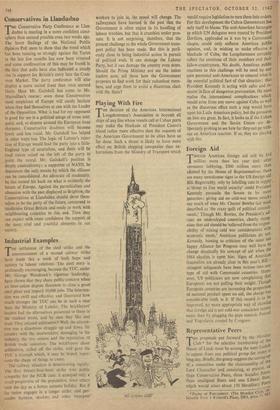Industrial Examples
THE settlement of the steel strike and the announcement of a second railway strike have made this a week of both hope and anxiety in labour relations. The steel story is profoundly encouraging, because the TUC, under Mr. George Woodcock's vigorous leadership, have shown that they share public concern when an inter-union dispute threatens to close a great steel plant and imperil 10,000 jobs. The interven- tion was swift and effective, and illustrated how much stronger the TUC can be in such a case than the Ministry of Labohr. The bricklayers' leaders had the alternatives presented to them in the starkest terms, and by men they like and trust. They refused arbitration? Well, the alterna- tive was a disastrous struggle up and down the country with the steelworkers, damaging to the industry, the two unions and the reputation of British trade unionism. The bricklayers chose arbitration, called off the strike, and gave the TUC a triumph which, it may be hoped, repre- sents the shape of things to come.
The railway situation is deteriorating rapidly. The first twenty-four-hour strike won public sympathy for the NUR case; it annoyed only a small proportion of the population, since others took the day as a bonus autumn holiday. But if the union engages in a longer strike, and per- suades busmen. dockers and other transport workers to join in, the mood will change. The railwaymen have learned in the past that the Government is often unjust in its handling of labour troubles, but that it crumbles under pres- sure. It is not surprising, therefore, that the present challenge to the whole Government trans- port policy has been made. But this is peril- ously close to being industrial action in pursuit of political ends. It can damage the Labour Party, but it can damage the country even more. Should the Prime Minister not see the union leaders now, tell them how the Government proposes to find work for their redundant mem- bers, and urge them to avoid a disastrous clash with the State?






































 Previous page
Previous page